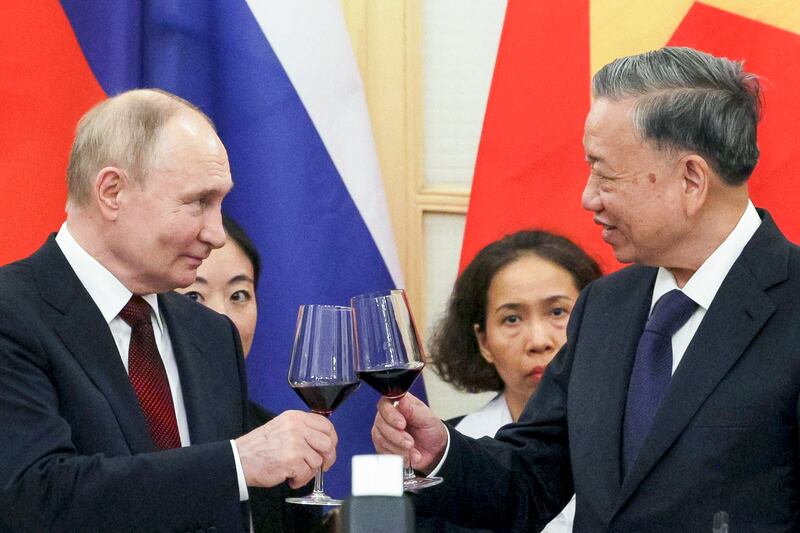There are significant challenges ahead for the Communist Party of Vietnam’s newly appointed leader, General Secretary To Lam, who has stated he will focus on reforming the country’s long-ruling regime, several analysts told Radio Free Asia.
Shortly after becoming general secretary – the most powerful position in the country – To Lam told state media that large national institutions like the government must change so that Vietnam can become a wealthy, democratic, just and civilized country.
In May 2022, World Bank experts recommended Vietnam undertake institutional reforms to fulfill its target of becoming an upper-middle-income country by 2045.
To Lam also pledged to “to build a strong Communist Party of Vietnam,” according to an article published last week in state-controlled media.
The party’s Central Committee voted unanimously on Aug. 3 to elect him as general secretary.
The appointment came two weeks after Nguyen Phu Trong died at the age of 80 after serving for 13 years in the post, who used his time in office to consolidate powers in the hands of the party.
It also followed a period of unprecedented upheaval in Vietnam’s domestic politics, largely because of an anti-corruption campaign, called “blazing furnace,” which was initiated by Trong.
The campaign, and the infighting it has generated, led to the departure of six members of the party's Politburo and the ascent of To Lam, a former minister of public security, to state president.
The previous president, Vo Van Thuong, was forced to step down amid corruption allegations, one of several senior government leaders forced out in the past year.
‘Obstacles and bottlenecks’
If To Lam really wants to tackle the country’s problems, he should repeal Article 4 of the Constitution, which was written in 1992 and established the Communist Party of Vietnam as the country’s leading force, said Tran Anh Quan, a young activist from Ho Chi Minh City.
The biggest obstacle to moving the country forward is the Communist Party’s one-party rule, which doesn’t allow for a political opposition or for freedom of speech, he said.
Removing Article 4 would allow multiple parties to compete in a fair and transparent manner, he said.
“Whoever is good would be selected by the people, and whoever has a poor performance would be replaced,” Quan said. “As a result, the country’s obstacles and bottlenecks would be resolved quickly.”

Such a move would be long overdue, said Norway-based economist Nguyen Huy Vu. The party’s top leaders are now members of Vietnam’s wealthiest class and Marxist-Leninist theory is no longer the glue that unites party members, he said.
Top leaders also must address the face that the country’s economy still depends on unskilled labor, raw materials and preferential taxes.
State-owned companies and Communist Party members’ local businesses, which receive significant privileges from the government, are the least open economic sectors, he said. It would be very difficult to eliminate these companies if the Communist Party remains in power, he said.
“Positions in the government, from big to small, are all allocated to Communist Party members, preventing other capable individuals from participating in the government’s administration,” he said. “If political reforms aren’t undertaken, the government’s ability to manage the economy and national policies won’t be improved.”
‘Old guidelines’
As state president, Lam has already visited Laos and Cambodia. He also met Russian President Vladimir Putin in Hanoi in June, and talked to him by phone last week after his general secretary appointment, Reuters reported.
Lam is scheduled to meet with Chinese President Xi Jinping in Beijing next week on his first foreign trip as general secretary, according to Reuters.
Lam could step down from the presidency in the coming months, possibly when the National Assembly meets in October, multiple Vietnamese and foreign officials told Reuters.
He’s expected to continue as general secretary until 2026, when the National Assembly ends its current five-year term. All of Vietnam’s top jobs will be up for grabs at a party congress, and To Lam could again be a candidate for the party’s leadership.
RELATED STORIES
[ To Lam elected as Vietnam’s top leaderOpens in new window ]
[ Meet To Lam, Vietnam's Communist Party chief and successor to Nguyen Phu TrongOpens in new window ]
[ Vietnam’s Communist Party chief Nguyen Phu Trong has died: state mediaOpens in new window ]
[ To Lam takes office as Vietnam’s presidentOpens in new window ]
In the meantime, it’s unclear if he really aims to reform the government, a Vietnam-based journalist who requested anonymity for security reasons. The remarks to state media last week were probably just a formality, he said.
“To Lam doesn’t have any new ideas,” he said. “His speeches are still based on Marxism-Leninism and [the Party’s] old guidelines.”
Additionally, To Lam wasn’t the first top government official to call for removing institutional reforms, Quan said.
Nguyen Xuan Phuc, who was prime minister from 2016 to 2021 and president from 2021 until last year, often complained that often when leaders give orders, “subordinates don’t listen.”
Similarly, the chairman of the National Assembly from 2021 until last April, Vuong Dinh Hue, also publicly acknowledged that the government apparatus had a “hot head/top and cold body/bottom” that often ignores the stated priorities of national leaders.
“It means that while top leaders call for reform and innovation, they just do it for show, and then when they fail to implement, they blame the lower levels,” Quan said.
Translated by Anna Vu. Edited by Matt Reed.
